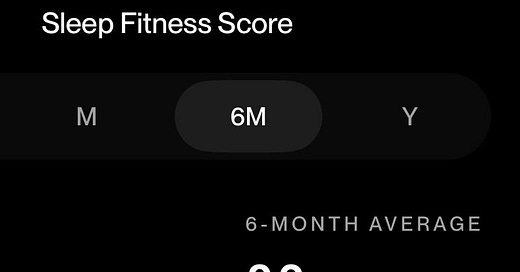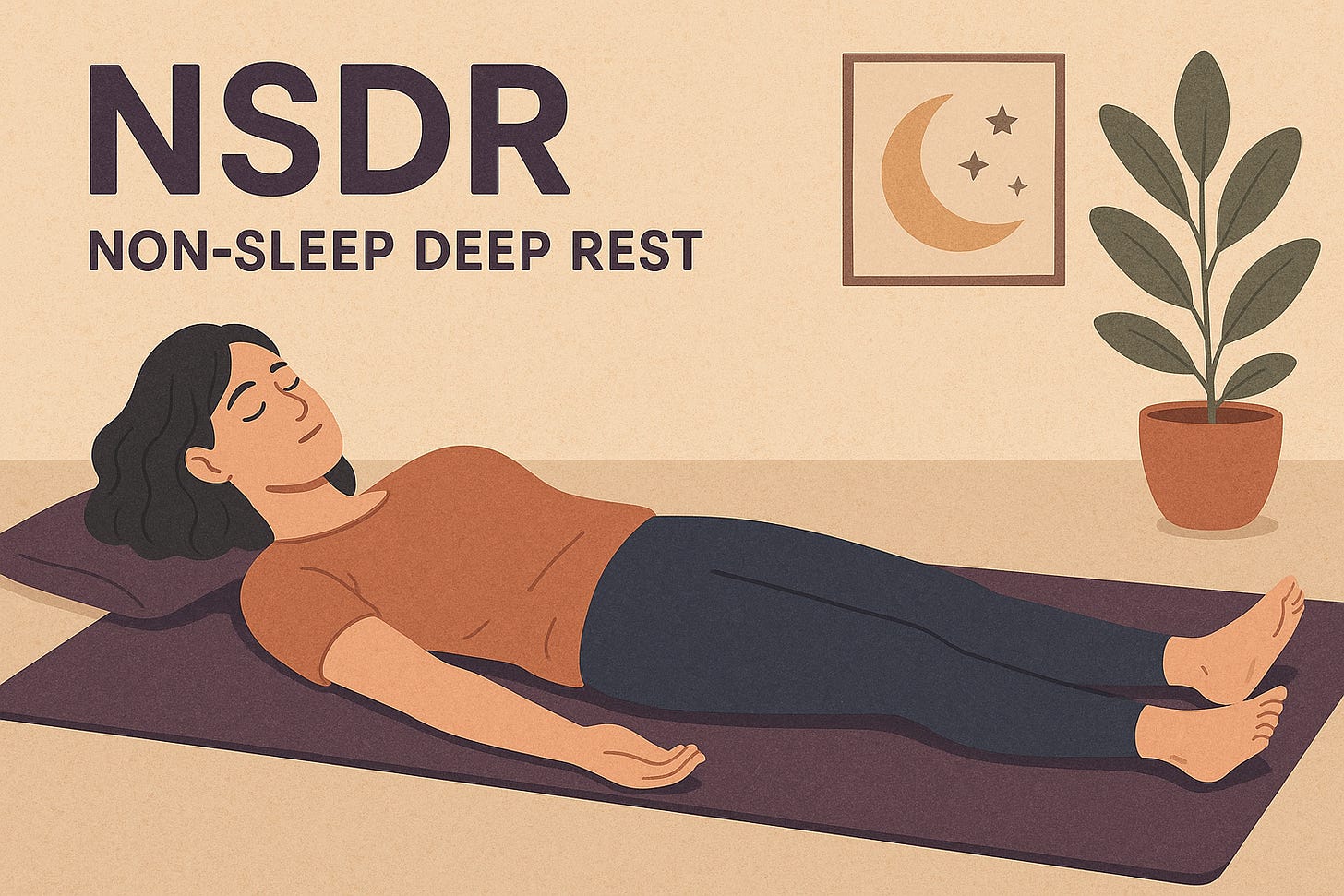Let’s break down the most efficient ways to improve your sleep using the 80/20 rule—what few things bring you the biggest return.
Sleep has quietly become one of the most impactful habits in my life. Not too long ago, I treated it as an afterthought. Now, I treat it like a skill. I track it, optimize it, and protect it—because I’ve seen firsthand how better sleep improves everything else: energy, focus, gym performance, mood, discipline, even willpower.
For the past six months, I’ve been tracking my sleep using tools like the Oura ring, Eight Sleep Pod, and recently WHOOP. My average sleep score has been 86, a significant improvement from the low 60s where I started three years ago. While 86 isn’t perfect—certainly not Brian Johnson level—it’s above average and a testament to the systems I’ve put in place.
The best part? Maintaining this score feels almost effortless now, thanks to the habits I’ve built around the 80/20 of sleep.
You're probably sleeping less than you think.
Most people confuse time in bed with time asleep. If you’re “in bed” for 8 hours, you’re realistically sleeping 6.5–7 hours, if that. And every missing hour carries a real cost.
In Why We Sleep, Matthew Walker talks about what happens during daylight savings: when people lose just one hour of sleep, the next day heart attacks and accidents spike by over 20–24%. And when people gain an hour, those same risks drop significantly.
That’s how powerful one hour is.
Now imagine the compound interest of consistently sleeping well.
Most people treat sleep like a switch.
You don’t just decide to sleep well. You set the conditions to make it happen. But most people:
Eat late
Sleep in hot, noisy rooms
Use phones right before bed
Treat weekends as a free-for-all
Panic when they wake up at night
Then they wonder why they’re tired.
The truth is: good sleep is predictable—if you build the system.
Better Sleep Starts Before You’re in Bed
• Get in Bed Earlier Than You Think You Should
You won’t sleep for 8 hours just because you’re in bed for 8.
Aim to be in bed at least 1 hour longer than your target sleep time. This covers:
Wind-down time
Sleep latency (falling asleep)
Micro-awakenings you don’t remember
If you want to sleep 8 hours, be in bed 9. Simple.
• Build a Rock-Solid Sleep Schedule
Your body has a rhythm. Disrupt it, and sleep quality tanks.
What works:
Fixed wake-up time, even on weekends
Same bedtime ±30 minutes
If you're out late, wake up at the same time, take a nap later, and reset
Consistency beats “catching up.”
• Optimize the Environment: Cold, Dark, Quiet
Most people know this, but don’t take it seriously enough.
Here’s what works:
Ideal room temp: ~18°C (65°F)
Use an Eight Sleep or similar cooling mattress if you can
If not: take a hot shower 1 hour before bed—triggers body cooling
Sleep mask + earplugs = high ROI sleep tools (especially for hotels)
Light = “wake up” signal
Noise = micro-arousals
Heat = higher heart rate + disrupted sleep stages
• Stop Eating So Late
This one’s hard for me too.
Big meals before bed =
❌ higher heart rate
❌ slower digestion
❌ disrupted deep sleep
The fix:
→ Stop eating 2–3 hours before sleep
→ If you have to snack, go light—low-calorie, low-sugar
A full stomach = a restless night.
Your Mind Is Part of the Sleep Game
Sleep is as much about mindset as it is about physical habits.
• Don’t Stress If You Wake Up at Night
This is underrated.
Sleep isn’t ruined just because you’re awake at 3am.
Do this instead:
Don’t look at the time
Avoid bright lights (use dim red light or low-light flashlight). I even wear sunglasses sometimes at night if I need to get up lol.
Remind yourself: just lying in bed still counts
Even if you’re not fully asleep, lying still in bed with your eyes closed provides some of the benefits of sleep.
Andrew Huberman calls this “Non-Sleep Deep Rest (NSDR).” Even if you don’t fall back asleep, your body still gets restorative benefits.
And ironically, that mindset helps you fall asleep again.
If I can leave you with one thing from this whole article, remember THIS.
• Master the “Don’t Care” Attitude
The paradox of sleep: the more you try, the harder it becomes.
Adopt this mindset:
“If I fall asleep, great. If I don’t, I’ll still rest and reset tomorrow.”
This eliminates the pressure. You win either way.
Remove Sleep Killers: Caffeine, Alcohol, and Overstimulation
• Caffeine Stays Longer Than You Think
Caffeine has a half-life of 5–6 hours, meaning that cup at 3pm is still half-active by 9pm.
What works:
Cut off caffeine 10–12 hours before bedtime
Stick to morning-only coffee
Track how late caffeine affects your sleep score (you’ll be surprised)
• Alcohol Wrecks Sleep Quality
Even 1–2 drinks reduce deep sleep and spike resting heart rate. I’ve seen this every single time in my Oura data.
If you drink, be mindful.
And if you had a bad night — ok, life happens. Remember, don’t let that bad night alone ruin your day.
Rapid-Fire Tools That Actually Help
✅ Sleep tracking (Oura, Eight Sleep, WHOOP)
✅ Earplugs + eye mask — $10 fixes
✅ Magnesium glycinate or threonate — best for sleep
✅ L-theanine, apigenin — calming supplements
✅ Nasal strips — open sinuses, better breathing
✅ Air purifier — especially if you have allergies
✅ Hot shower before bed — body cool-down effect
✅ Salt tablets — some say they reduce nighttime urination (needs more testing)
The TL;DR
If you want better sleep, don’t just “try harder”—build a system.
Here’s your 80/20 checklist:
Give yourself enough time in bed
Stay consistent with your schedule
Cool, dark, quiet environment
Cut food 2–3 hours before bed
Don’t panic if you wake up / can’t fall asleep
Avoid caffeine/alcohol late in the day
Use tools that make it easier
If you get just 5 out of 7 of these right, you’re way ahead.
And if your sleep is already solid—awesome. You’re compounding returns in your health, productivity, creativity, and longevity.
If you’re still figuring it out—keep going. Sleep is a skill worth mastering.
Until next time. Sleep well. Wake up better.
Resources & Tools Mentioned
Books & Science:
Why We Sleep by Matthew Walker – the sleep science bible
Andrew Huberman on Non-Sleep Deep Rest (NSDR) – podcast + tools
PubMed study on daylight saving time and heart attacks – yes, even one hour matters
Sleep Trackers:
Oura Ring – advanced sleep and recovery tracking
Eight Sleep Pod – smart cooling and heating mattress cover
WHOOP – wearable focused on strain, recovery, and sleep
Supplements:
Magnesium Threonate – brain-boosting and sleep-friendly
Magnesium Glycinate – calming and affordable
L-theanine – promotes relaxation without drowsiness
Apigenin – plant-based compound that helps with sleep latency
Sleep Aids & Tools:
Mack’s Earplugs – tried-and-tested for quiet nights
Manta Sleep Mask – 100% blackout for deeper sleep
Breathe Right Nasal Strips – opens up nasal passages for easier breathing
LEVOIT Air Purifiers – great for allergy sufferers and cleaner bedroom air
Other Hacks:
Why hot showers help you cool down before bed – body temperature and sleep quality





Great read the insights are quite detailed
Waiting for the new ones !!
Sure mate!